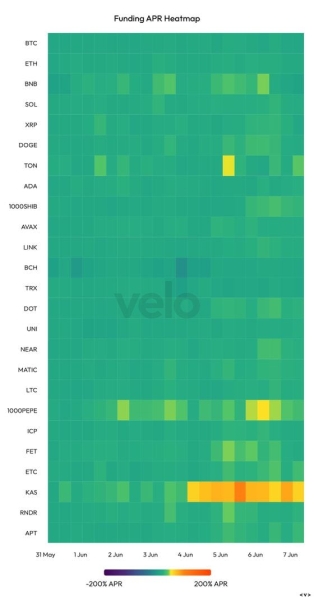- The latest breakout is characterized by a lack of speculative froth as opposed to March.
- Renewed rate cuts by G-7 central banks and oil price slide favor risk assets.
Bitcoin (BTC) has surged back above the significant threshold of $70,000, setting its sights on retesting the record highs it achieved in March. This recent upswing above the said level appears positively distinct from the one seen three months ago. Let’s delve into the reasons why.
Less froth
A frothy market, often a precursor to a price correction, is characterized by a leveraged speculative frenzy. So far, perpetual futures tied to bitcoin and other cryptocurrencies show no such signs.
While open interest-weighted funding rates continue to hover above zero, they are well below the highs seen in March, according to data source Coingecko.

In other words, bullish long positions are dominant and bulls are willing to pay bears to keep their positions open. However, the market is less heated than in March. Exchanges collect funding rates every eight hours.
The lack of speculative froth means the latest breakout above $70,000 could be longer-lasting than in March. Funding rates in other large-cap cryptocurrencies tell the same story.

The chart by Velo Data shows funding rates in large-cap coins, including BTC, currently hover in the green zone, representing the annualized 10% to 20% range. Funding rates over 100% represented the overheated category marked by red bars.
At press time, the annualized three-month futures basis (premium) in bitcoin on major offshore exchanges like Binance, OKX, and Deribit ranged between 10% and 13%, significantly below March highs above 25%, per Velo Data. The measured rise in the premium also suggests the absence of speculative fervor.
“Looking at the current market positioning, I don’t think things are anywhere frothy like they were in late March/early April,” Greg Magadini, Director of Derivatives at Amberdata, said in a weekly newsletter.
“We can clearly see that the futures basis is much lower than around peak positioning and the underlying OI buildup is rather stable for BTC,” Magdini added.
Positive macro
The present macroeconomic environment appears more supportive of risk assets, including cryptocurrencies, than in March.
Per Bloomberg, investment banking giants like JPMorgan Chase & Co. and Citigroup Inc. expect the U.S. Federal Reserve to cut the benchmark borrowing cost by 25 basis points to the 5% to 5.25% range next month, pivoting toward renewed liquidity easing. The Fed fund futures show traders pricing rate cuts in the year’s final quarter.
The European Central Bank and Bank of Canada have already pulled the trigger.
The bias for rate cuts starkly contradicts the situation in March when traders feared resurgent inflation would force the U.S. central bank to resume rate hikes.
The recent swoon in oil prices is also supportive of bitcoin, according to the newsletter service LondonCryptoClub.
The per barrel price for the West Texas Intermediate (WTI) crude has dropped by over 13% to $75.50 in one month, signaling disinflation and putting downward pressure on government bond yields. The decline in yields, the so-called risk-free rates, is said to incentivize risk-taking in financial markets.
“Oil is now 12% off its highs and up just 7% YTD. It’s hard to play a ‘reflation’ narrative with oil falling, and lower oil typically pulls 10-year inflation expectations lower, which in turn pulls 10-year U.S. yields lower…which in turn can help push bitcoin higher indeed,” founders of LondonCryptoClub said.
Edited by Parikshit Mishra.






